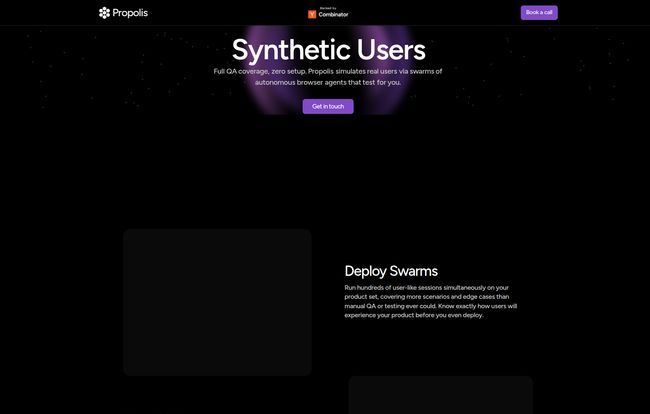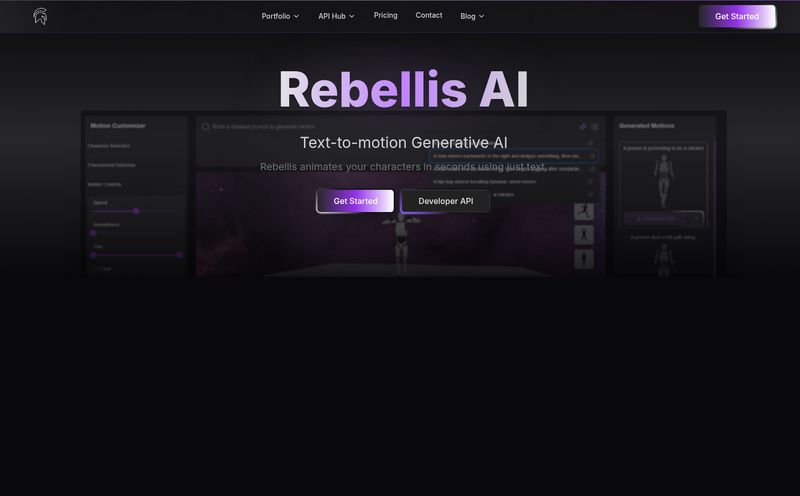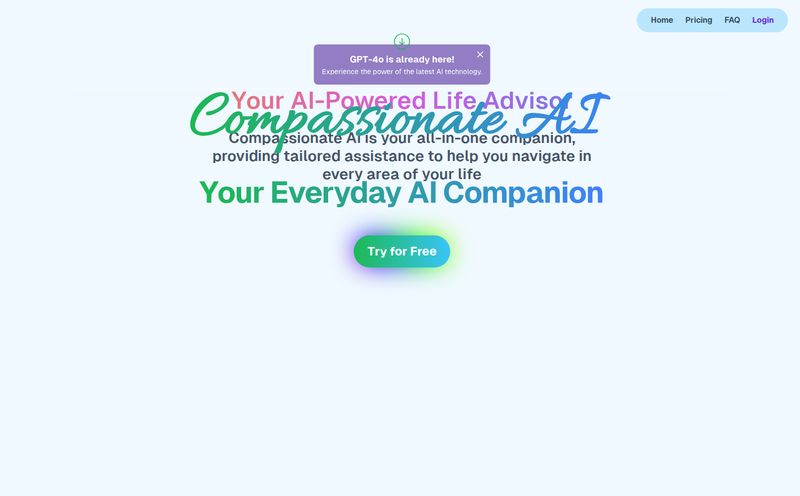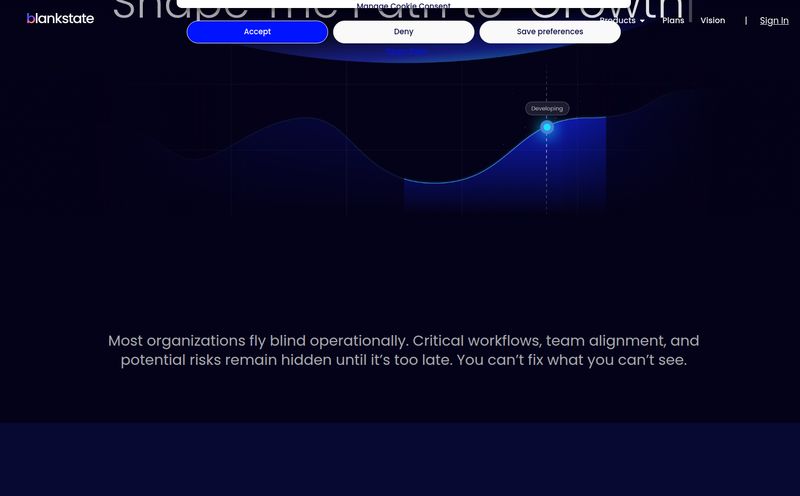There’s a special kind of dread that sets in around 4 PM on a Friday. You know the one. It’s the pre-deployment dread. The nagging feeling that despite all the manual clicking, the regression tests, and the frantic checks, some tiny, obscure bug is lurking in the shadows, ready to ruin everyone’s weekend. We’ve all been there. It’s a rite of passage in the software world.
For years, we've tried to battle this beast with automation frameworks. We’ve all had our flame wars over Selenium vs. Cypress vs. Playwright. We've spent countless hours writing and, more painfully, maintaining test scripts that seem to break if a developer so much as looks at a CSS file the wrong way. It’s a constant, expensive, and frankly, draining process.
So when a tool comes along with a name like Propolis, backed by the folks at Y Combinator no less, and claims to eliminate manual QA with… AI swarms? My curiosity piques. Is this another buzzword-filled promise, or are we looking at a genuine shift in how we build and ship software?
So, What is Propolis, Really?
Forget everything you know about writing test scripts. Seriously, throw it out the window. Propolis isn’t a framework you use to build tests; it’s an autonomous system that does the testing for you. The core idea revolves around what they call “Synthetic Users.”

Visit Propolis
Think of it like this. Instead of one human tester methodically clicking through your app, Propolis unleashes a swarm of hundreds of AI-powered agents into your product simultaneously. It’s like hiring an army of tiny, tireless interns who drink nothing but electricity and report back with military precision. These agents don’t follow a script. They learn your application, explore every possible user flow, and try to break things, just like a real, curious (and sometimes chaotic) user would.
The part that really made me lean in closer? Zero setup. No scripting. No complicated configuration. According to their site, the AI agents learn how to use your product just by… well, using it. This is the holy grail for so many dev teams who are resource-strapped and can’t afford a dedicated QA automation engineer.
The Propolis Promise: How It Actually Works
It all sounds a bit like science fiction, but the mechanics behind it are fascinating. It’s less about magic and more about a clever application of AI to a notoriously stubborn problem.
Deploying the Swarm
Once you point Propolis at your application, it can run hundreds of user-like sessions at once. This isn’t linear testing. This is massively parallel. It’s the difference between checking every room in a mansion one by one versus having a dedicated person in every single room, all at once, checking for flaws. This approach is designed to cover a massive surface area of your product incredibly quickly, finding those weird edge-case bugs that only appear when you click three unrelated things in a bizarre order.
Learning Like a Real Person
I have to admit, I was skeptical about the “no scripting” claim. We’ve been burned before. But the premise here is that the agents observe and learn the product structure. They understand what a button is, what a form does, and what a logical user path looks like. They then explore all permutations of these paths. The goal is to catch not just when something throws a `500 error`, but when a user flow hits a dead end or a UX promise is broken.
Adapting on the Fly
Here’s the killer feature for me. One of the biggest pains of traditional automation is maintenance. A developer changes a button’s ID, and suddenly your entire test suite is bleeding red. Propolis claims its agents adapt instantly to these changes. Because they understand the product conceptually—'this is the login button' rather than 'this is the button with id=login-btn-final-2'—they aren’t as brittle. If this holds up, it could save development teams thousands of hours a year in test maintenance alone.
Key Features That Make a Difference
Beyond the core concept, a few features stood out as being particularly thoughtful for a modern dev team. The ability to set up customized run schedules is huge. You can have the swarms descend after every single merge, every deploy to staging, or just run continuously in the background. It’s about building a constant safety net.
And when a bug is found? Propolis provides detailed traces. It’s not just a pass/fail. You get a step-by-step replay of exactly what the agent did to trigger the bug. This closes the gap between QA and dev, reducing the time spent on that frustrating back-and-forth of “Well, it works on my machine.” For larger organizations, they also mention things like enhanced bug reporting and enterprise-grade compliance, which shows they're thinking about scale.
Can It Genuinely Replace Manual QA?
Okay, this is the big question. My hot take? No, but also, yes. Let me explain.
I don't think any AI, at least not yet, can fully replicate the nuanced, context-aware, and empathetic testing of a skilled human QA professional who deeply understands the user’s intent and frustration. That kind of exploratory testing and usability feedback is still an art form.
However, what Propolis can do is completely obliterate the most soul-crushing part of QA: repetitive regression testing. All those hundreds of test cases you have to run before every release to make sure you didn’t break something else? Propolis is designed to automate that entire chunk of work away. It’s a force multiplier. It frees up your human testers to focus on what they do best: thinking creatively about the user experience, not just checking if a button is still blue.
It’s less of a replacement and more of a promotion. It promotes your QA process from a manual, tedious chore to a strategic, human-centric function with an AI-powered safety net.
The Elephant in the Room: How Much Does Propolis Cost?
I clicked on their pricing page, eager to see the numbers, and was greeted by a… 404 page. The irony is not lost on me, and honestly, it’s kind of endearing. A little bug on teh website of a bug-finding tool. It happens to the best of us!
Jokes aside, a missing pricing page usually means one of two things: they're either still finalizing their tiers or, more likely, they're focused on a custom/enterprise pricing model where you have to “Get in touch.” This is common for B2B SaaS tools solving a high-value problem. While I always prefer transparent pricing, you have to think about the ROI here. How much does a full-time manual QA engineer cost? Or an outsourced team? How much does one critical post-launch bug cost in emergency developer time and lost customer trust? When you frame it that way, a custom quote might seem a lot more reasonable.
My Final Verdict: Should You Summon the Swarm?
After digging into what Propolis offers, I'm genuinely excited. It feels like a step in the right direction. For too long, QA has been treated as a bottleneck or a cost center, when it should be a source of confidence and quality. This tool seems to understand that.
If your team is drowning in manual regression testing, if your release cycles are slow and filled with anxiety, or if you're a startup that needs to ensure quality without hiring a dedicated QA team from day one, then Propolis is absolutely something you should look into. It represents a move away from manual labor and toward intelligent oversight.
It won't solve every problem. You'll still need smart humans to think about the big picture. But it might just be the tool that finally kills the regression-testing grind and lets your team focus on building great things. And maybe, just maybe, it’ll help us all enjoy our Fridays again.
Frequently Asked Questions about Propolis
- Does Propolis require any coding or scripting?
- Nope. One of its main selling points is that it's a zero-setup, no-scripting platform. The AI agents learn your application autonomously.
- How does Propolis handle changes in my application's UI?
- The AI is designed to understand the product conceptually, so it adapts to changes in the UI or underlying code automatically, which is a major advantage over traditional, brittle test scripts.
- Is Propolis suitable for small startups?
- While pricing isn't public, the efficiency gains could be massive for a small team. By automating QA, it allows a small number of developers to ship with the confidence of a much larger team. It's best to contact them for a demo and quote.
- What kind of bugs does Propolis find?
- It focuses on simulating real user behavior to find functional bugs, broken user flows, front-end errors, and other issues that would prevent a user from successfully completing a task.
- How is this different from tools like Cypress or Selenium?
- Cypress and Selenium are test automation frameworks. They give you the tools to write your own tests. Propolis is an autonomous QA platform. It generates and runs the tests for you using AI, requiring no test-writing from your team.
- Who is behind Propolis?
- Propolis is developed by Propolis Technologies, Inc., a startup backed by the highly respected accelerator Y Combinator, which is a strong signal of its potential and credibility.



